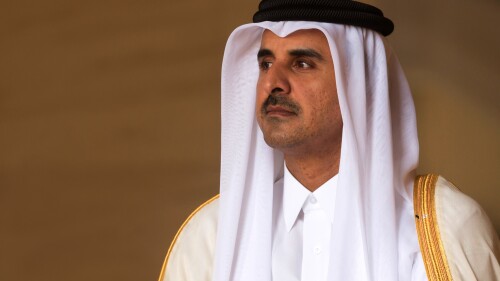“You don’t belong here.” These words, never spoken aloud but implied in countless interactions, have followed me from the streets of Colombia to the halls of an American university. As a Colombian immigrant and Zionist, I’ve found myself caught in a crossfire of prejudice and misunderstanding that intensified dramatically after October 7, 2023.
A cashier responded with gibberish to my Colombian parents as they tried in their broken English to ask where they could find a child’s car seat. “Blah, blah, blah,” he mocked, his face contorted in a caricature of confusion. In that moment, I saw my parents’ dignity stripped away, their humanity denied over a simple request for help. In the years that followed, I saw people treat us based on preconceived notions. I did not grow up around many Colombians, so I always had to adjust depending on the crowd I was with.
I found myself caught in a racial limbo, too “brown” for some, too “white” for others, a walking contradiction in a society obsessed with progressive categorization of people by skin tone. I felt exhausted, never fully accepted by anyone. When people accused me of having “white privilege” for having lighter skin, I wondered where it was hidden, as every step to success required sacrifice.
“You only got in because you’re Latina,” a classmate sneered when I gained acceptance to a prestigious university. Someone told me many people secretly think Latinos only make it in because of Diversity, Equality, and Inclusion. The implications were clear: my achievements were not my own, but a handout based on my ethnicity.
I found community with people who faced the same biases and hate when a friend invited me to a local Jewish cultural center. There, I discovered a microcosm of diversity I had never imagined existed within the Jewish community. People outside do not understand the depth of the Jewish diaspora until they interact with it. There are Ashkenazi, Mizrahi, Ethiopian, Sephardic, and even Latino Jews who have faced tribulations others overlook due to stereotypes that Jews have privilege for being Jewish.
As I delved deeper into Jewish history and culture, I found striking parallels with my own heritage. My ancestors, the Muisca, built an impressive civilization before losing their land. The last time they performed a public ceremony was in 1563.
As I delved deeper into Jewish history and culture, I found striking parallels with my own heritage. My ancestors, the Muisca, built an impressive civilization before losing their land.
If the Jewish people could maintain their identity through millennia of persecution, couldn’t I reconnect with my Muisca roots? This realization sparked my journey into both Zionism and a deeper exploration of my own heritage.
As I learned more about the history of Jewish presence in Israel, I realized it didn’t matter how many generations they were removed from the land; they belonged there. Just as my people have not practiced Muisca traditions openly since the 1500s, our right to identify as Native remained untaken away.
Little did I know that my newfound connection to Zionism would soon overshadow every other aspect of my identity in the eyes of others. I participated in a fellowship in Washington, D.C., in the fall of 2023. I had recently visited Israel and seen a wonderful kibbutz, Kfar Aza.
On October 7th, 2023, Hamas launched a devastating attack on Israel, resulting in the deaths of over 1,200 people, including residents of Kfar Aza. Shocked and heartbroken, I shared my sorrow on social media. To my shock and horror, the response was immediate and brutal.
Overnight, I became a pariah in my fellowship program. I had worked extremely hard for this fellowship. The cost was steep, and I had cobbled together full-ride scholarships just to attend. During my years at the University of Texas at Austin (UT), I worked two or three jobs to make it through each semester. I knew I earned this fellowship.
Within weeks, my identity as a Zionist eclipsed everything else about me. Rumors spread quickly, painting me as a supporter of genocide – a horrifying accusation that couldn’t be further from the truth.
The administrators of my fellowship heard about the bullying and supported me, but I felt too intimidated to report any of my peers who confronted me after I posted about Kfar Aza. They did not offer condolences but informed me about the Palestinians who were dying as if it were my fault.
I found myself defending not just my beliefs, but my right to have them. I wondered, “Why am I, a Colombian refugee who already overcame prejudice, once again at the bottom of the barrel for believing the deaths of people on October 7 were not justified? Doesn’t this country value free speech?” It made no sense; I felt trapped in a dystopian matrix. I watched in horror as my peers posted things like “Stop condemning October 7; we have no right to criticize how Palestinians resist.”
In the spring of 2024, I returned to UT and saw protest after protest against Israel. The same groupthink and Marxist tactics my family escaped in Colombia mirrored the tactics pro-Palestinian crowds used at my school. If you did not stand by the opinions of these crowds, you faced harassment and disruption to your learning experience.
The parallels to Colombia’s violent past were impossible to ignore. The calls for a violent revolution, with chants of “globalize the intifada” and “death to America,” reminded me of the communist guerillas in Colombia, who threatened bombings and murders against innocent civilians if they did not have their way with the Colombian government. The tactics were different, but the atmosphere of fear and intimidation was chillingly familiar.
As a Colombian immigrant, a descendant of the Muisca, and a Zionist, I stand at the intersection of multiple identities. Each has taught me the value of preserving one’s culture and the pain of displacement. Post-October 7, I realized a dire need for a movement of American patriots and Zionists to unite in this cause lest future generations of Americans betray our country to leaders and foreign adversaries who wish us ill.






